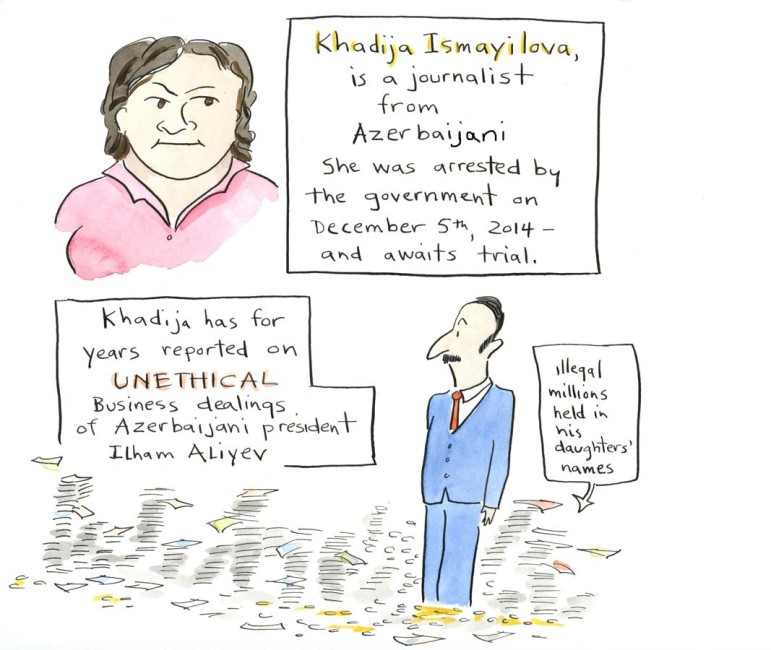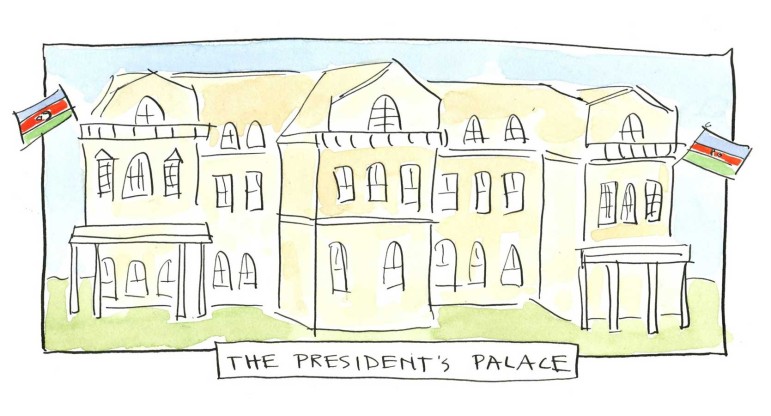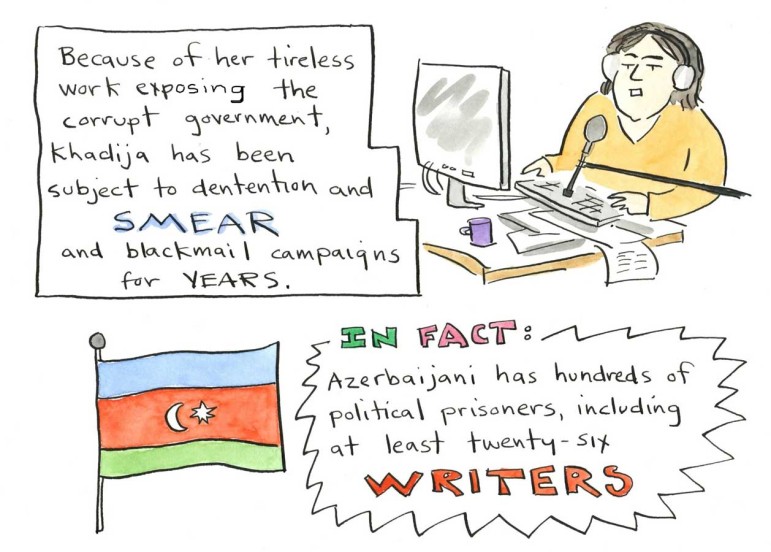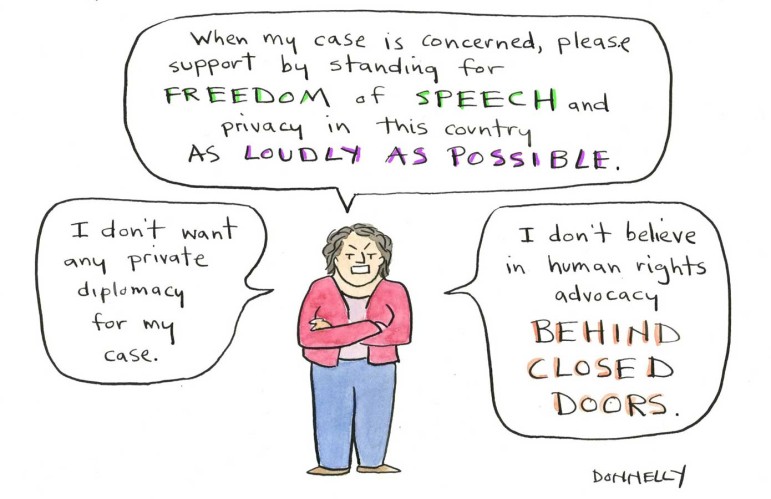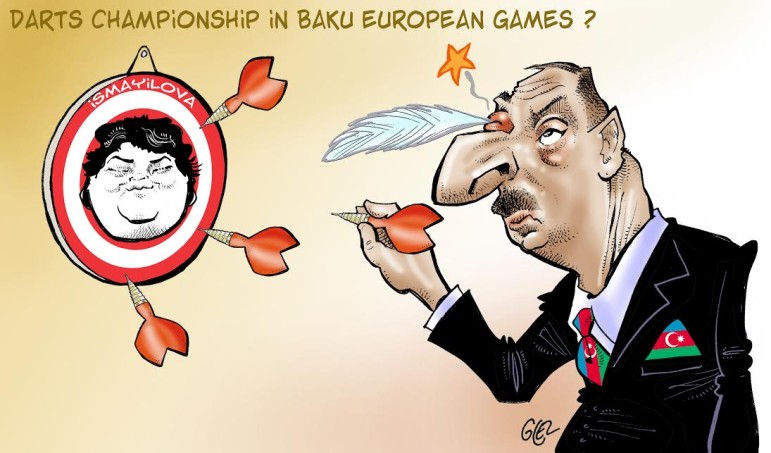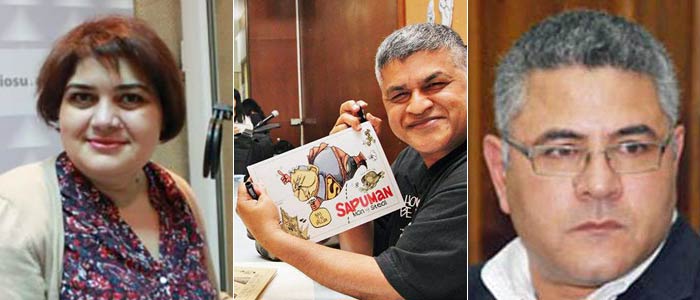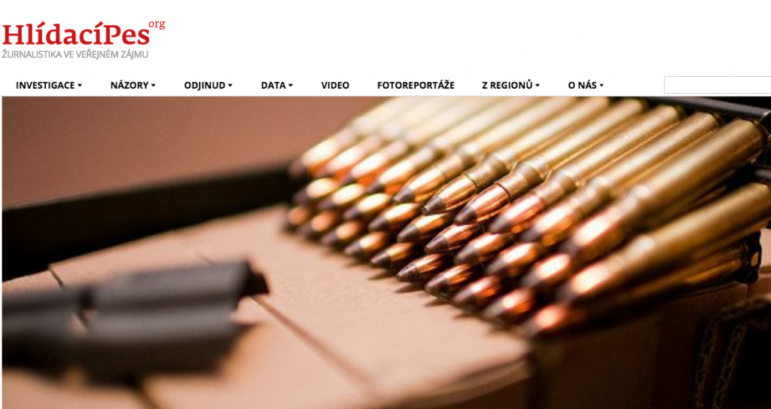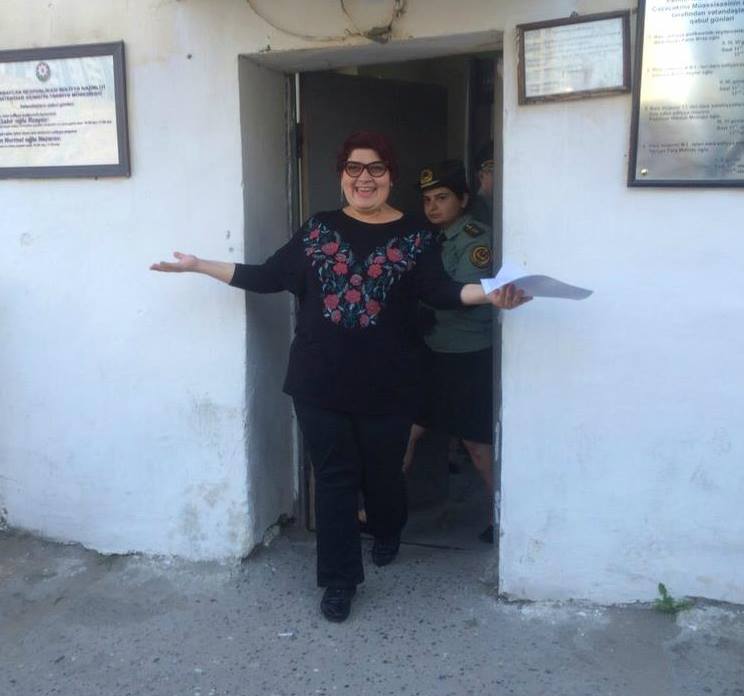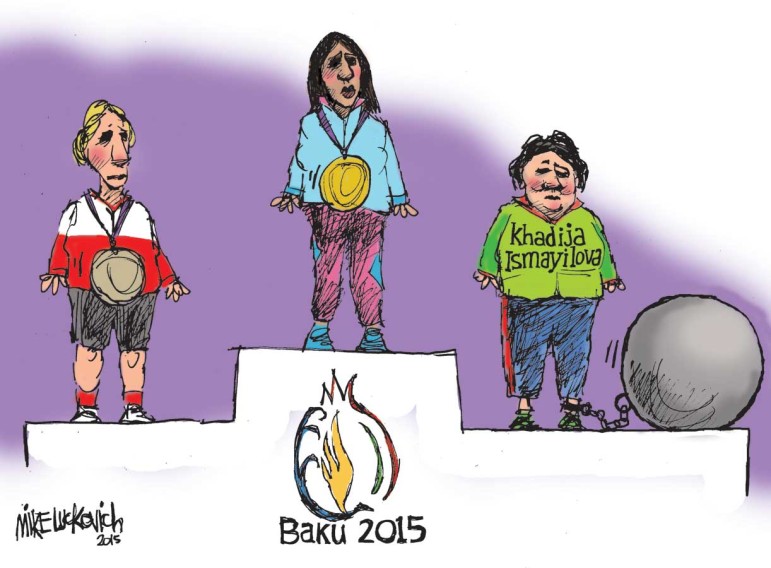

Ismayilova’s Plight Told in PEN Center’s Cartoon Tribute
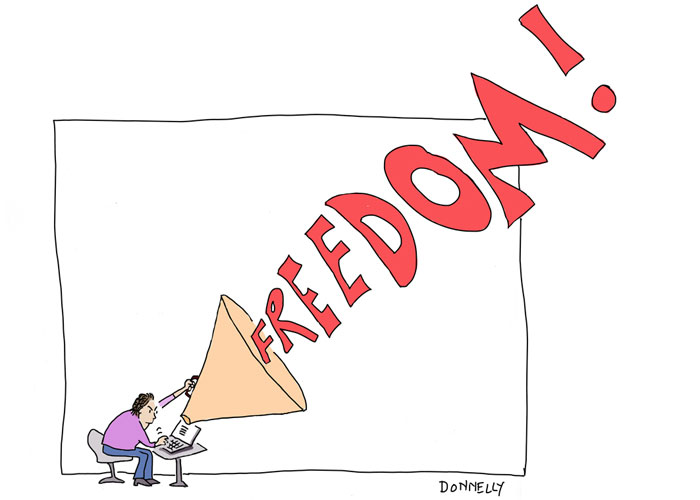 As the glittering PEN awards ceremony came to a close on Tuesday, a set of cartoons flashed onto the screen.
As the glittering PEN awards ceremony came to a close on Tuesday, a set of cartoons flashed onto the screen.
At the end of the night, postcards were handed out to members of the audience bearing the same cartoons.
The pictures all told aspects of the story of a journalist from Azerbaijan. Khadija Ismayilova had just been presented with PEN’s Barbara Goldsmith Freedom to Write award – in absentia, since she was unable to attend the ceremony herself.
A determined investigative reporter who worked to uncover corruption in the face of a vicious government crackdown on civil society, Ismayilova was jailed in December in Baku, the capital of Azerbaijan.
“PEN stands by Azerbaijani journalist Khadija Ismayilova,” Nossel told the audience at the annual literary gala as she unveiled the images.
One cartoon by New Yorker contributor Chris Weyant depicts the president of Azerbaijan, Ilham Aliyev, as a gigantic pig, saying: “Of course we arrested Khadija Ismayilova. She was making us look bad!” A sign next to the pig welcomes visitors to Azerbaijan, but warns them to avoid asking questions.
Ben Schwartz’s artwork, meanwhile, captures the likeness of President Aliyev standing on one side of prison bars while Ismayilova stands on the other; Aliyev is holding a sock puppet on one hand, and tells Ismayilova: “Now if you’ll excuse me, I’m going to speak with a real journalist.”
The Concept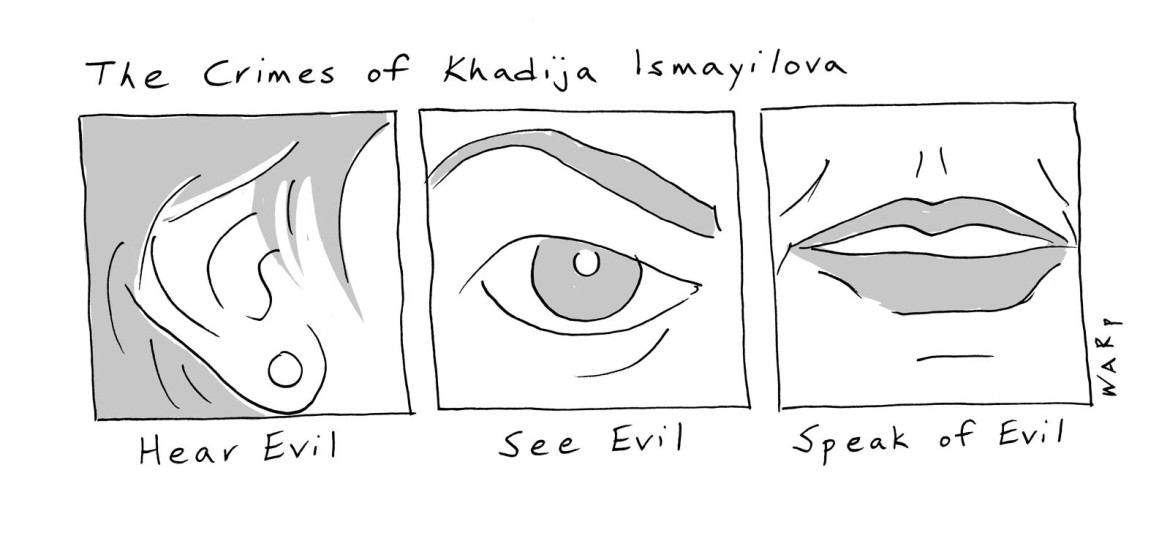
The PEN American Center’s annual gala focused strongly this year on the theme of freedom of expression and the power of political cartoons, and saw the staff of Charlie Hebdo magazine honored with the Courage award.
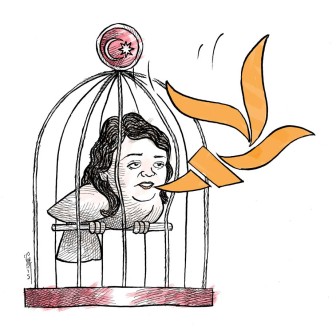 Antonio Aiello, content director at PEN, was the driving force behind the Khadija Ismayilova cartoon series. He said the idea came from a desire to portray Ismayilova’s story in an accessible way that would inspire understanding and compassion even outside Azerbaijan.
Antonio Aiello, content director at PEN, was the driving force behind the Khadija Ismayilova cartoon series. He said the idea came from a desire to portray Ismayilova’s story in an accessible way that would inspire understanding and compassion even outside Azerbaijan.
Ismayilova was arrested in Azerbaijan on Dec. 5 on the unusual charge of inciting a former colleague to attempt suicide. The case is widely believed to be politically motivated, and followed Ismayilova’s exposure of the dubious business dealings of President Aliyev’s family and inner circle.
Cartooning became an obvious way to present this tale of injustice, Aiello explained. “[An individual cartoon] provides a narrative visual, with a little short bit of text, that can communicate the very complex notion of freedom of expression but also Khadija’s case,” he said.
According to PEN, staff had also been inspired by previous cartoons of Ismayilova drawn by Gündüz Aqayev of Meydan TV.
The Process
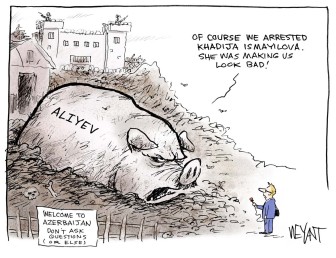 Aiello and his team began their quest to commission the cartoons by first contacting Bob Mankoff, the New Yorker’s cartoon editor, who also co-presented the Courage Award to the Charlie Hebdo team.
Aiello and his team began their quest to commission the cartoons by first contacting Bob Mankoff, the New Yorker’s cartoon editor, who also co-presented the Courage Award to the Charlie Hebdo team.
Mankoff said political cartoons targeting specific individuals were not the norm at the New Yorker. But he rallied cartoonists from the United States to the cause, including New Yorker cartoonists David Sipress, Kim Warp, Ben Schwartz, Chris Weyant, Jess Ruliffson, and Liza Donnelly, as well as Mike Luckovich from the Atlantic Constitution.
Liza Donnelly, a cultural envoy for the US State Department, then brought cartoonists in from around the world. They included Damien Glez from Burkina Faso, Michel Kichka of Israel, Marilena Nardi from Italy, Riber Hansson of Sweden, Cristina Sampaio of Portugal, and Kianoush Ramezani, an Iranian who has lived in exile in Paris since 2009.
According to Aiello, the process not only harnessed the power of satirical cartooning but also provided an opportunity for community building, bringing together literary and creative styles with an advocacy motive.
In total 12 individual cartoons were produced. PEN will also launch a social media campaign centered around the artworks, aimed at bringing them to a wider audience.
Liza Donnelly has also produced a separate cartoon strip telling Khadija’s story in sequence, which will be released by the PEN American Center next week.
The Award
 The Barbara Goldsmith Freedom to Write Award is given every year to a journalist who has been imprisoned, or who has dared to write in the face of suppression, discrimination or a government that determined to silence them. There are thought to be at least 221 journalists currently in prison worldwide, and the award strives to call attention to their plight. 35 out of 39 jailed journalists who received the plaudit have since been freed.
The Barbara Goldsmith Freedom to Write Award is given every year to a journalist who has been imprisoned, or who has dared to write in the face of suppression, discrimination or a government that determined to silence them. There are thought to be at least 221 journalists currently in prison worldwide, and the award strives to call attention to their plight. 35 out of 39 jailed journalists who received the plaudit have since been freed.
Before contributing to this cartoon call-to-action, Mankoff admitted, many of the cartoonists did not know Ismayilova’s story: “They weren’t familiar at all. I mean, we all had to go find out and look at what it was.”
But they rose to the occasion, and signed copies of the cartoons to be auctioned off.
“We’re not expecting a Nobel Prize for what we do, but we think it’s a good thing to do for a good cause,” said Mankoff.
Khadija: The Inspiration
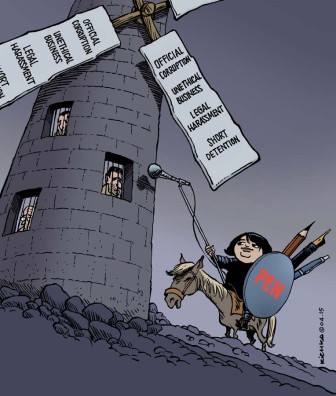 Nossel has described Ismayilova as “irrepressible”. Indeed, in prison, Ismayilova appears to have remained remarkably positive. She has sent letters from prison urging fellow journalists to keep going.
Nossel has described Ismayilova as “irrepressible”. Indeed, in prison, Ismayilova appears to have remained remarkably positive. She has sent letters from prison urging fellow journalists to keep going.
Despite the fact that the man who initially accused her has now withdrawn the allegations, Ismayilova remains in detention and now faces a slew of fresh charges: tax evasion, abuse of power, running an illegal business, and embezzlement. She was convicted of libel in a separate case and fined 2,500 manat (about US$ 2,417) in February.
Ismayilova knew she was under threat of arrest over the course of last year, yet she continued to work regardless.
“The only way to prove oppressive regimes wrong is to continue uncovering corruption. My arrest proves one more time, that it is important to make change happen. Yes, there is a price to pay. But it is worth it,” she said in a letter sent from jail in December 2014. The quote appeared on screen at the awards.
Ismayilova drew praise for her efforts from CNN host Christiane Amanpour, PEN president Andrew Solomon, and Barbara Goldsmith herself.
The ceremony concluded with a call to action by Ismayilova’s friend and colleague, Emin Milli, to fight for freedom of expression, as the hall rang out with cheers of “Kha-di-ja, Kha-di-ja, Kha-di-ja!”
 Kara Morgan is a daily news reporter at the Organized Crime and Corruption Reporting Project in Sarajevo, Bosnia and Herzegovina. She is a third-year political science and international affairs student and a member of the University Scholars program at Northeastern University in Boston, Massachusetts. She is also an undergraduate researcher at theSustainability & Data Sciences Lab at NU, focusing on the impacts of global climate change on vulnerable populations.
Kara Morgan is a daily news reporter at the Organized Crime and Corruption Reporting Project in Sarajevo, Bosnia and Herzegovina. She is a third-year political science and international affairs student and a member of the University Scholars program at Northeastern University in Boston, Massachusetts. She is also an undergraduate researcher at theSustainability & Data Sciences Lab at NU, focusing on the impacts of global climate change on vulnerable populations.





